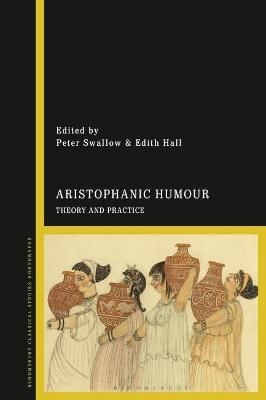
Aristophanic Humour
Bloomsbury Academic (Verlag)
978-1-350-10152-4 (ISBN)
This question is addressed in two ways. The first half of the volume offers an in-depth discussion of humour theory – a field heretofore largely overlooked by classicists and Aristophanists – examining various theoretical models within the specific context of Aristophanes’ eleven extant plays. In the second half, contributors explore Aristophanic humour more practically, examining how specific linguistic techniques and performative choices affect the reception of humour, and exploring the range of subjects Aristophanes tackles as vectors for his comedy. A focus on performance shapes the narrative, since humour lives or dies on the stage – it is never wholly comprehensible on the page alone.
Peter Swallow is the Tassos and Angele Nomikos Research Associate at King’s College London, UK. He teaches Classics at Notting Hill and Ealing High School, and has previously taught at KCL and Goldsmiths, University of London. His doctorate explored the Victorian reception of Old Comedy, and his publications include studies on the translation and performance of Aristophanes. Edith Hall is Professor of Classics at the University of Durham and Consultant Director of the Archive of Performances of Greek and Roman Drama in Oxford, UK. Her books on ancient Greek culture and its reception include The Return of Ulysses (2008), Greek Tragedy (2010), Adventures with Iphigenia in Tauris (2013) and Introducing the Ancient Greeks (2015).
List of Illustrations
List of Contributors
Preface
Introduction: Dissecting the Frog(s) (Peter Swallow, King’s College London, UK)
Part 1: Theory
2. Beyond a Joke: Making Humour Theory Work with Aristophanes (N.J. Lowe, Royal Holloway, University of London, UK)
3. Play as Shared Psychological Register: Paidiá, Laughter and Aristophanes (Edith Hall, King’s College London, UK)
4. Aristophanic Incongruities (Craig Jendza, University of Kansas, USA)
5. Laughter, or Aristophanes’ Joy in the Face of Death (Mario Telò, UC Berkeley, USA)
6. Laughter and Collective Trauma in Aristophanic Comedy (Pavlos Sfyroeras, Middlebury College, USA)
7. The Satirist as Troll?: Sociopathic Strains in Aristophanes (Ralph M. Rosen, University of Pennsylvania, USA)
8. The Hilarious Politics of the Supernatural in Aristophanic Comedy (Edith Hall, King’s College London, UK)
9. Aristotle on Aristophanic Humour (Pierre Destrée, Université Catholique de Louvain, Belgium)
Part 2: Practice
10. Surface and Deep Aristophanic Parody (Athina Papachrysostomou, University of Patras, Greece)
11. A Grammar of Para Prosdokian (Dimitrios Marios Kanellakis, University of Oxford, UK)
12. Laughing against the Machine (Maria Gerolemou, University of Cyprus, Cyprus)
13. No Laughing Matter? The Comic Potential of Madness in Aristophanes (Natalia Tsoumpra, University of Glasgow, UK)
14. Sexual Violence and Aristophanic Humour (Peter Swallow, King’s College London, UK)
15. Aristophanes, Philosopher: The Comedy of Truth in Nietzsche and Freud (Adam Lecznar, University College London, UK)
16. Melancholia and Laughter: Modern Greek Productions of Aristophanes in the Twenty-First Century (Magdalena Zira, King’s College London, UK)
17. Saving Classics with The Clouds: A Case Study in Adapting Aristophanes (David Bullen, Royal Holloway, University of London, UK)
Notes
Bibliography
Index
| Erscheinungsdatum | 10.07.2020 |
|---|---|
| Zusatzinfo | 20 bw illus |
| Verlagsort | London |
| Sprache | englisch |
| Maße | 156 x 234 mm |
| Gewicht | 594 g |
| Themenwelt | Literatur ► Klassiker / Moderne Klassiker |
| Geisteswissenschaften ► Sprach- / Literaturwissenschaft ► Anglistik / Amerikanistik | |
| Geisteswissenschaften ► Sprach- / Literaturwissenschaft ► Literaturwissenschaft | |
| ISBN-10 | 1-350-10152-4 / 1350101524 |
| ISBN-13 | 978-1-350-10152-4 / 9781350101524 |
| Zustand | Neuware |
| Haben Sie eine Frage zum Produkt? |
aus dem Bereich


